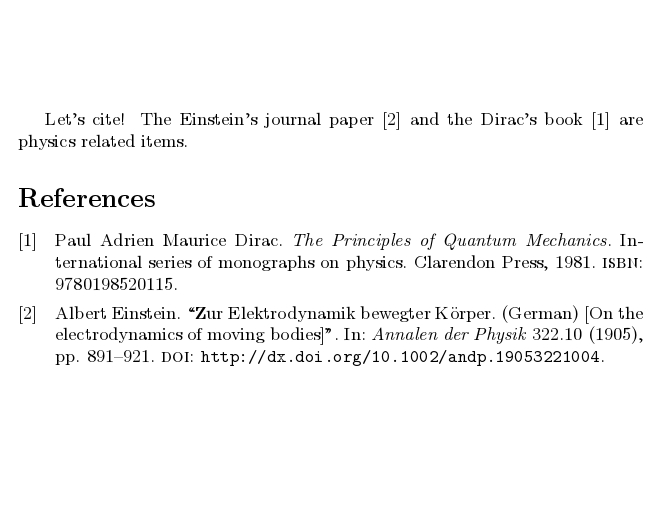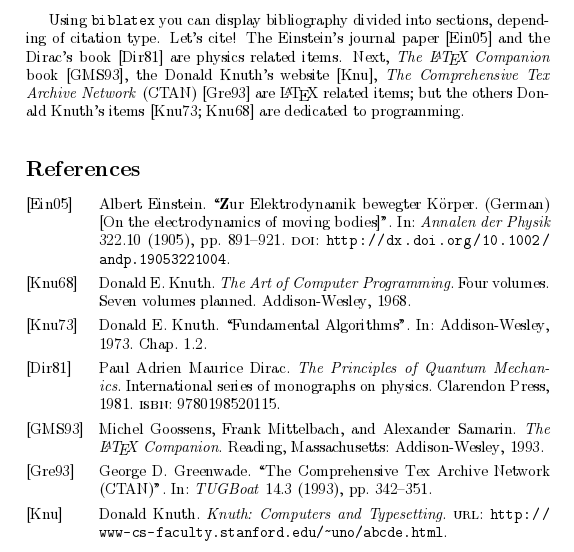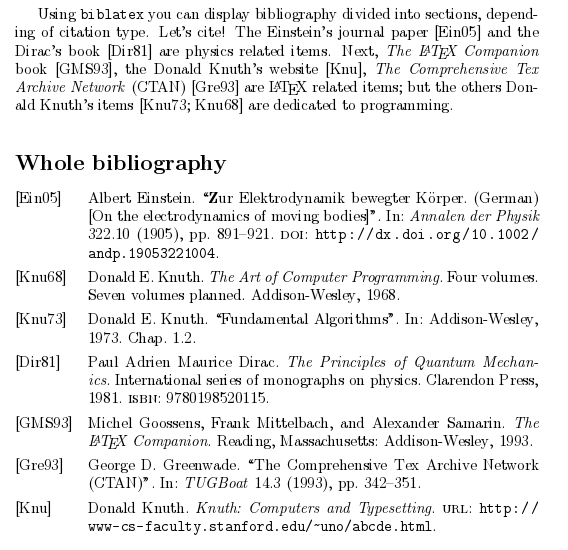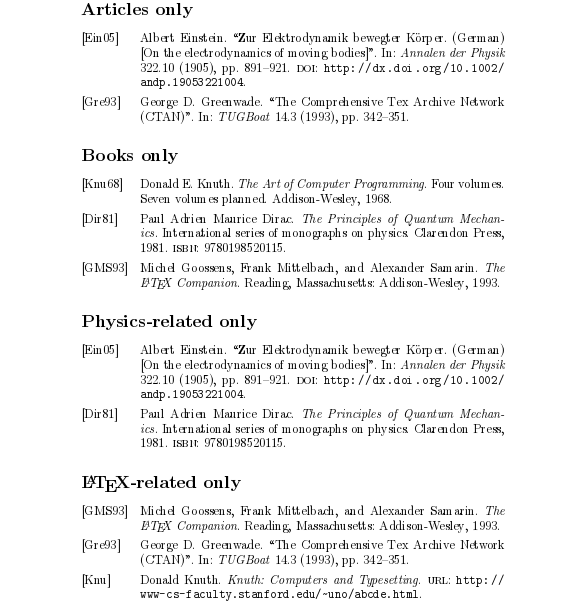Bibliography management with biblatex
When it comes to bibliography management packages, there are three main options in LaTeX: bibtex, natbib and biblatex. Biblatex is a modern program to process bibliography information, provides an easier and more flexible interface and a better language localization than the other two options. This article explains how to use biblatex to manage and format the bibliography in a LaTeX document.
Introduction
A minimal working example of the biblatex package is shown below:
\documentclass{article}
\usepackage[utf8]{inputenc}
\usepackage[english]{babel}
\usepackage{biblatex}
\addbibresource{sample.bib}
\begin{document}
Let's cite! The Einstein's journal paper \cite{einstein} and the Dirac's
book \cite{dirac} are physics related items.
\printbibliography
\end{document}

There are four bibliography-related commands in this example:
\usepackage{biblatex}- Imports the package biblatex.
\addbibresource{sample.bib}- Imports the bibtex data file sample.bib, this file is the one that includes information about each referenced book, article, etc. See the bibliography file section for more information.
\cite{einstein}- This command inserts a reference within the document, [1] in this case, that corresponds to an element in the bibliography, "einstein" is a keyword corresponding to an entry in sample.bib.
\printbibliography- Prints the list of cited references, the default title is "References" for the article document class and "Bibliography" for books and reports.
Overleaf provides several templates with pre-defined styles to manage bibliography. See these examples.
Open a biblatex package example on Overleaf
Basic usage
Several parameters can be passed to the package importing statement, let's see
\documentclass{article}
\usepackage[utf8]{inputenc}
\usepackage[english]{babel}
\usepackage{comment}
\usepackage[
backend=biber,
style=alphabetic,
sorting=ynt
]{biblatex}
\addbibresource{sample.bib}
\title{Bibliography management: \texttt{biblatex} package}
\author{Overleaf}
\date{ }
\begin{document}
\maketitle
Using \texttt{biblatex} you can display bibliography divided into sections,
depending of citation type.
Let's cite! The Einstein's journal paper \cite{einstein} and the Dirac's
book \cite{dirac} are physics related items.
Next, \textit{The \LaTeX\ Companion} book \cite{latexcompanion}, the Donald
Knuth's website \cite{knuthwebsite}, \textit{The Comprehensive Tex Archive
Network} (CTAN) \cite{ctan} are \LaTeX\ related items; but the others Donald
Knuth's items \cite{knuth-fa,knuth-acp} are dedicated to programming.
\medskip
\printbibliography
\end{document}

Some extra options, inside brackets and comma-separated, are added when importing biblatex:
backend=biber- Sets the backend to sort the bibliography,
biberis the default one and recommended since it provides full localization for several commands and the styles for biber are easier to modify because they use standard LaTeX macros. The other supported backend isbibtex, which is a more traditional program; if set as backend will only used to sort the bibliography, so no bibtex styles can be used here.
style=alphabetic- Defines the bibliography style and the citation style, in this case
alphabetic. Depending on the style more citation commands might be available. See bibliography styles and citation styles for more information.
sorting=ynt- Determines the criteria to sort the bibliographic sources. In this case they are sorted by year, name and title. See the reference guide for a list of sorting options.
The rest of the commands were already explained at the introduction.
Open a biblatex package example on Overleaf
The bibliography file
The bibliography files must have the standard bibtex syntax
@article{einstein,
author = "Albert Einstein",
title = "{Zur Elektrodynamik bewegter K{\"o}rper}. ({German})
[{On} the electrodynamics of moving bodies]",
journal = "Annalen der Physik",
volume = "322",
number = "10",
pages = "891--921",
year = "1905",
DOI = "http://dx.doi.org/10.1002/andp.19053221004",
keywords = "physics"
}
@book{dirac,
title={The Principles of Quantum Mechanics},
author={Paul Adrien Maurice Dirac},
isbn={9780198520115},
series={International series of monographs on physics},
year={1981},
publisher={Clarendon Press},
keywords = {physics}
}
@online{knuthwebsite,
author = "Donald Knuth",
title = "Knuth: Computers and Typesetting",
url = "http://www-cs-faculty.stanford.edu/~uno/abcde.html",
keywords = "latex,knuth"
}
@inbook{knuth-fa,
author = "Donald E. Knuth",
title = "Fundamental Algorithms",
publisher = "Addison-Wesley",
year = "1973",
chapter = "1.2",
keywords = "knuth,programming"
}
...
This file contains records in a special format, for instance, the first bibliographic reference is defined by:
@article{...}- This is the first line of a record entry,
@articletells BibTeX that the information stored here is about an article. The information about this entry is enclosed within braces. Besides the entry types shown in the example (article,book,onlineandinbook) there are a lot more, see the reference guide.
einstein- The label
einsteinis assigned to this entry, is an identifier that can be used to refer this article within the document.
author = "Albert Einstein",- This is the first field in the bibliography entry, indicates that the author of this article is Albert Einstein. Several comma-separated fields can be added using the same syntax
key = value, for instance: title, pages, year, URL, etc. See the reference guide for a list of possible fields.
The information in this file can later be printed and referenced within a LaTeX document, as shown in the previous sections, with the command \addbibresource{sample.bib}. Not all the information in the .bib file will be displayed, it depends on the bibliography style set in the document.
Open a biblatex package example on Overleaf
Customizing the bibliography
Biblatex allows high customization of the bibliography section with little effort. It was mentioned that several citation styles and bibliography styles are available, and you can also create new ones. Another customization option is to change the default title of the bibliography section.
\documentclass{article}
\usepackage[utf8]{inputenc}
\usepackage[english]{babel}
\usepackage{comment}
\usepackage[
backend=biber,
style=alphabetic,
sorting=ynt
]{biblatex}
\addbibresource{sample.bib}
\title{Bibliography management: \texttt{biblatex} package}
\author{Overleaf}
\date{ }
\begin{document}
\maketitle
Using \texttt{biblatex} you can display bibliography divided into sections,
depending of citation type.
Let's cite! The Einstein's journal paper \cite{einstein} and the Dirac's
book \cite{dirac} are physics related items.
Next, \textit{The \LaTeX\ Companion} book \cite{latexcompanion}, the Donald
Knuth's website \cite{knuthwebsite}, \textit{The Comprehensive Tex Archive
Network} (CTAN) \cite{ctan} are \LaTeX\ related items; but the others Donald
Knuth's items \cite{knuth-fa,knuth-acp} are dedicated to programming.
\medskip
\printbibliography[title={Whole bibliography}]
\end{document}

The additional parameter title={Whole bibliography} passed inside brackets to the command \printbibliography is the one that changes the title.
The bibliography can also be subdivided into sections based on different filters, for instance: print only references from the same author, the same journal or similar title. Below an example.
\printbibliography[type=article,title={Articles only}]
\printbibliography[type=book,title={Books only}]
\printbibliography[keyword={physics},title={Physics-related only}]
\printbibliography[keyword={latex},title={\LaTeX-related only}]

Here, the bibliography is divided in 4 sections. The syntax of the commands used here is explained below:
\printbibliography[type=article,title={Articles only}]- Only prints entries whose type is "article", and sets the title "Articles only" for this section. The same syntax works for any other entry type.
\printbibliography[keyword={physics},title={Physics-related only}]- Filters bibliography entries that include the word "physics" in any of the fields. Sets the title "Physics-related only" for said section.
Open a biblatex package example on Overleaf
Adding the bibliography in the table of contents
For the bibliography the be printed in the table of contents an extra option must be passed to \printbibliography
\printbibliography[
heading=bibintoc,
title={Whole bibliography}
]
\printbibliography[heading=subbibintoc,type=article,title={Articles only}]

A section and a subsection are added to the table of contents:
- In the first case, adding
heading=bibintocadds the title to the table of contents as an unnumbered chapter if possible or as an unnumbered section otherwise.
- The second case is
heading=subbibintocthat adds the title as a second level entry in the table of contents, in this example as a subsection nested in "Whole bibliography".
Open a biblatex package example on Overleaf
Reference guide
Supported entry types
| article | book | mvbook |
| inbook | bookinbook | suppbook |
| booklet | collection | mvcollection |
| incollection | suppcollection | manual |
| misc | online | patent |
| periodical | suppperiodical | proceedings |
| mvproceedings | inproceedings | reference |
| mvreference | inreference | report |
| set | thesis | unpublished |
| custom | conference | electronic |
| mastersthesis | phdthesis | techreport |
| datatype |
Supported entry fields (The printed information depends on the bibliography style)
| abstract | afterword | annotation | annotator |
| author | authortype | bookauthor | bookpagination |
| booksubtitle | booktitle | chapter | commentator |
| date | doi | edition | editor |
| editortype | eid | entrysubtype | eprint |
| eprinttype | eprintclass | eventdate | eventtitle |
| file | foreword | holder | howpublished |
| indextitle | institution | introduction | isan |
| isbn | ismn | isrn | issue |
| issuesubtitle | issuetitle | iswc | journalsubtitle |
| journaltitle | label | language | library |
| location | mainsubtitle | maintitle | month |
| note | number | organization | origdate |
| origlanguage | origlocation | origpublisher | origtitle |
| pages | pagetotal | pagination | part |
| publisher | pubstate | reprinttitle | series |
| shortauthor | shortedition | shorthand | shorthandintro |
| shortjournal | shortseries | shorttitle | subtitle |
| title | translator | type | url |
| venue | version | volume | year |
Bibliography sorting options
| option | description |
|---|---|
nty |
sort by name, title, year |
nyt |
sort by name, year, title |
nyvt |
sort by name, year, volume, title |
anyt |
sort by alphabetic label, name, year, title |
anyvt |
sort by alphabetic label, name, year, volume, title |
ydnt |
sort by year (descending), name, title |
none |
entries are processed in citation order |
Further reading
For more information see